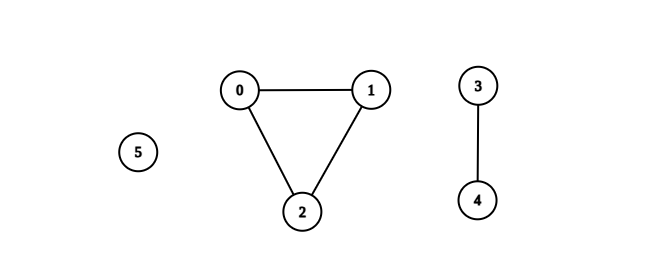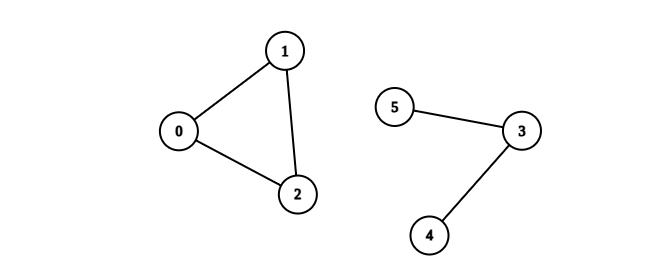2793. Count The Number Of Complete Components¶
Difficulty: Medium
LeetCode Problem View on GitHub
2793. Count the Number of Complete Components
Medium
You are given an integer n. There is an undirected graph with n vertices, numbered from 0 to n - 1. You are given a 2D integer array edges where edges[i] = [ai, bi] denotes that there exists an undirected edge connecting vertices ai and bi.
Return the number of complete connected components of the graph.
A connected component is a subgraph of a graph in which there exists a path between any two vertices, and no vertex of the subgraph shares an edge with a vertex outside of the subgraph.
A connected component is said to be complete if there exists an edge between every pair of its vertices.
Example 1:

Input: n = 6, edges = [[0,1],[0,2],[1,2],[3,4]] Output: 3 Explanation: From the picture above, one can see that all of the components of this graph are complete.
Example 2:

Input: n = 6, edges = [[0,1],[0,2],[1,2],[3,4],[3,5]] Output: 1 Explanation: The component containing vertices 0, 1, and 2 is complete since there is an edge between every pair of two vertices. On the other hand, the component containing vertices 3, 4, and 5 is not complete since there is no edge between vertices 4 and 5. Thus, the number of complete components in this graph is 1.
Constraints:
1 <= n <= 500 <= edges.length <= n * (n - 1) / 2edges[i].length == 20 <= ai, bi <= n - 1ai != bi- There are no repeated edges.
Solution¶
class Solution {
public int countCompleteComponents(int n, int[][] edges) {
ArrayList<ArrayList<Integer>> adj = new ArrayList<>();
for (int i = 0; i <= n + 1; i++) adj.add(new ArrayList<>());
for (int current[] : edges) {
int u = current[0], v = current[1];
adj.get(u).add(v);
adj.get(v).add(u);
}
int vis[] = new int[n + 1];
int count = 0;
for (int i = 0; i < n; i++) {
if (vis[i] == 0) {
ArrayList<Integer> temp = new ArrayList<>();
dfs(i,adj,vis,temp);
if (temp.size() == 1) count++;
else {
boolean flag = true;
for (int l = 0; l < temp.size(); l++) {
int current = temp.get(l), p = adj.get(current).size();
if (p != temp.size() - 1) {
flag = false;
break;
}
}
if (flag == true) count++;
}
}
}
return count;
}
public static void dfs(int u, ArrayList<ArrayList<Integer>> adj, int vis[], ArrayList<Integer> res) {
vis[u] = 1;
res.add(u);
for (int child : adj.get(u)) {
if (vis[child] == 0) dfs(child, adj, vis, res);
}
}
}
Complexity Analysis¶
- Time Complexity:
O(?) - Space Complexity:
O(?)
Approach¶
Detailed explanation of the approach will be added here